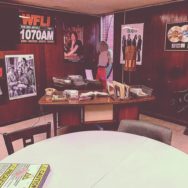Top40-Radio-Museum-Roadtrip-Bob Davis Podcast 881
Radio’s Unique Museum
I worked in radio for years. Radio is still my first love despite podcasting for ten years now. Most noteworthy in this podcast is a visit to a unique museum. Learn more in Top40-Radio-Museum-Roadtrip-Bob Davis Podcast 881.
Top 40’s Roots
Top Forty radio’s roots are in the mid south and deep south. Now there’s a shrine to top forty radio in Chattanooga Tennessee. Even more, there’s also a working radio station there visitors can tour.
Small and Medium Markets
Especially relevant to the roots of top forty radio in the south, are the many small and medium markets in this region that spawned some of America’s great radio talent.
When Radio Was The Only Game In Town
First of all in the 1950’s, 1960’s, and most of the 1970’s there was no Internet, no social media, no cable television and no way for a generation to communicate except for radio. I’ll explain in In Top40-Radio-Museum-Roadtrip-Bob Davis Podcast 881.
Building Companies and Lives
Second, operators and employees of these radio stations in growing small and medium markets across the country could build companies and lives on the profits.
All About The Music
Above all the music made top forty radio and radio itself a phenomenon.
A One Off Moment In History
The events and situations that made all of that possible will certainly never happen again.
A slice of Architectural History Too
Furthermore during that period of time some of the most successful AM top forty stations were housed near their transmitters. Many in neighborhoods and developments.
Most Are Already Gone
Low slung period brick buildings and mid century architecture and furnishings were the order of the day. Most of those old stations are gone.
This Place Remains And It’s Worth Seeing
In contrast WFLI AM and FM remain exactly as it was through the 1960’s and 70’s, in Chattanooga, Tennessee.
Fun Fun Fun
Finally my friend and I took a tour and spent an afternoon remembering how much fun radio used to be. Thanks again to the National Top Forty Radio Hall of Fame and Museum.
In Top40-Radio-Museum-Roadtrip-Bob Davis Podcast 881 you’ll hear the story of the radio station and more.
Sponsored By Ryan Plumbing and Heating of Saint Paul
Top40-Radio-Museum-Roadtrip-Bob Davis Podcast 881
Podcast: Play in new window | Download (Duration: 32:41 — 74.8MB) | Embed
Subscribe: Apple Podcasts | RSS




